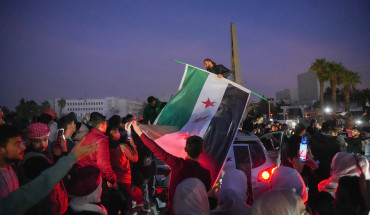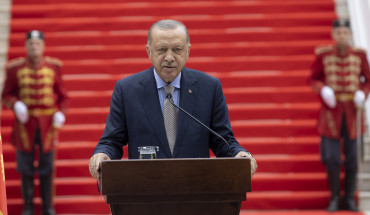Iraqi Prime Minister Haider al-Abadi visited Turkey on Wednesday to discuss potential joint steps against northern Iraq’s Kurdistan Regional Government (K.R.G.) following last month’s independence referendum. Ankara is hoping to influence Iraqi politics by cultivating close ties to Baghdad, but the newly forged Turkish-Iraqi alliance is unlikely to hold, leaving Turkey isolated in the post-referendum Iraq.
K.R.G. President Massoud Barzani has been Turkey’s closest ally in Iraq, but the post-referendum dynamics threaten his rule. Baghdad recaptured territories where the Kurds had sought to establish their rule in the last few years and the political map of northern Iraq is being redrawn, much to the disadvantage of the Kurds. Particularly troubling for the Kurds is the loss of the oil-rich city of Kirkuk. Without the city, the K.R.G. controls just half the oil it controlled until recently. Many see this as Barzani overplaying his hand and opposition parties in the Kurdish region are asking him to resign.
That leaves Turkey without a partner in Iraqi politics. Ankara was quick to throw its support behind Baghdad against its one-time close ally, but the shifting balance of power away from Barzani is a blow to Turkey’s Iraq strategy. Turkey has long sought to counter Iran’s influence in Iraq. Ankara midwifed electoral coalitions and openly backed Sunni prime-ministerial candidates to that effect. It sought to stitch together Arab nationalists and engaged the K.R.G. But Turkey has lacked the tools Iran has at its disposal to be the key external powerbroker in Iraq. Iran not only has worked with its Shiite and Kurdish allies to influence Iraqi politics, it also relied on Shiite militias and insurgents to carve up a space for itself in Iraq. It also exerts soft power through trade and economic ties, activities to export its official ideology, and Arabic-language programs that reflect Tehran’s thinking on regional affairs. Turkey lags behind on all these fronts.
Recent developments open the door for greater Iranian influence in Iraq. The Iraqi-Kurdish clash not only solidifies Iran’s influence over the Iraqi government, Iran also exerts sizable influence over Barzani’s main rival, the Patriotic Union of Kurdistan (P.U.K.) Despite Tehran’s strong opposition to the referendum, Iranian Foreign Minister Javad Zarif attended the funeral of Jalal Talabani, former Iraqi president and leader of the P.U.K., while President Recep Tayyip Erdogan was publicly scolding his Iraqi Kurdish ally, Barzani. Iran’s chief spymaster travelled to the Iraqi city of Sulaymaniyah to meet with P.U.K. leaders to convince them to withdraw from Kirkuk.
Turkey relied on Barzani in its fight against the P.K.K. Turkey’s forward operating bases in northern Iraq have played an important role in reducing the Kurdistan Workers’ Party’s (P.K.K.) ability to coordinate and arm within Iraq. After the fall of Mosul to ISIS in 2014, Turkey deployed troops to the Bashiqa base, north of Mosul, with the approval of the K.R.G., and the base proved important in checking the P.K.K. All that is now under threat. The P.K.K. might use the rift between the Kurdish parties in northern Iraq to consolidate its power and Ankara does not have a partner to give a hand in preventing that.
As Ankara parts ways with Barzani, it is now hedging its bet on Baghdad and the Turkmen of Kirkuk, who are ethnically linked to Turkey. A day after the independence vote, Turkish and Iraqi soldiers held a joint military exercise in Turkey near its border with Iraq. Turkey also told Iraq it would deal only with the Iraqi government on crude oil exports.
But Abadi cannot be the partner Ankara needs in Iraq. Despite the display of unity, sharp differences remain between Ankara and Baghdad. There is a deep sense of distrust toward Turkey in Baghdad. Suggestions in pro-government circles that Turkey could stake a claim to Kirkuk and Mosul, former Ottoman lands, is deeply disturbing to the Iraqi government.
Turkey’s opening with the K.R.G., its ethnic ties with the Turkmen in Kirkuk and relations with the major political actors in Mosul have raised suspicions about the intent of Turkey’s interventions among Iraq’s nationalists. Turkey’s troop presence in northern Iraq therefore sparked a strong reaction from Baghdad, which demanded Turkey withdraw troops immediately. Bashiqa remains a flashpoint in bilateral ties.
Iraq will not be the ally Turkey wants in its efforts to keep the P.K.K. in check. To the contrary, Baghdad is likely to make Ankara’s fight against the P.K.K. more difficult. The Iraqi prime minister has expressed outrage at Turkish cross-border operations into northern Iraq against P.K.K. targets. He might see the P.K.K. as a card against Turkey, and thus might not do much to counter the militant group.
Ankara also wants to use the Turkmen of Kirkuk to have a foothold in Iraqi politics. Erdogan often casts himself as their protector. But despite their cultural and linguistic links to Turkey, many Turkmen feel they are part of Iraq and view Turkey’s intervention on their behalf as counter-productive. Some Iraqi Turkmen also feel Turkey’s strong ties with the K.R.G. have come at their expense and Ankara quietly accepted the capture of Kirkuk by Kurdish forces after the Iraqi army fled the town in 2014.
After the Kurdish referendum, Ankara’s Iraq policy is in disarray and Abadi’s visit will not salvage it.
The Middle East Institute (MEI) is an independent, non-partisan, non-for-profit, educational organization. It does not engage in advocacy and its scholars’ opinions are their own. MEI welcomes financial donations, but retains sole editorial control over its work and its publications reflect only the authors’ views. For a listing of MEI donors, please click here.












